Carl E. Olson's Blog, page 252
December 29, 2011
More novel conversations...
This time on Maria Radio with Ignatius Press editor Vivian Dudro about two classic novels recently republished by Ignatius: Ida Elizabeth by Sigrid Undset and The Song at the Scaffold by Gertrud von Le Fort. The Preface to the latter novel can be read here:
China's Catholics: Sixty Years of Faith, Resistance, and Reaching for Freedom

China's Catholics: Sixty Years of Faith, Resistance, and Reaching for Freedom | Anthony E. Clark | Ignatius Insight
Karl Marx once said that, "History is nothing but the activity of men in pursuit of their own ends." Chinese authorities appear to have listened well to this famous quote about the utility of history; history is often conveniently reinvented to support an official ideology. October 1st is National Day in China. It is the day on which Mao Zedong, the "Great Helmsman," stood above the vast crowds at Tiananmen and proclaimed the founding of the People's Republic of China in 1949. It commemorates the day that Communism became the official ideological engine of Chinese society, and for Catholic Christians this also marks the beginning of decades of struggle to maintain their faith and identity as members of the world's largest religious community. Indeed, there are roughly the same number of Catholics in the world as there are Chinese.
Just prior to the nation-wide celebration of the "birth of new China," Beijing's Catholic cathedral was ordered to celebrate the sixty-year anniversary of the founding of China's Catholic Patriotic Association, which is most curious as the Patriotic Association was officially founded in 1957, making it only fifty-four years old. No matter, according to the Religious Affairs Bureau, China's Catholics have "enjoyed the benefits of independence from Rome" since shortly after the country's establishment, around sixty years ago.
The reality is that in 1957 China's Religious Affairs Bureau convened a large number of China's Catholic hierarchy and officially established the Catholic Patriotic Association, founded on the principal that China's Church should not "obey a foreign influence". This meant that from that day forward the hierarchy was expected to follow the Chinese Protestant system of "self-governance, self-support, and self-propagation." China's government even tried to pressure a Chinese bishop into claiming the title "pope." When offered this position the shrewd bishop replied, "I'll happily accept the position ... as long as I am elected in Rome and live in the Vatican."
The existence of China's Catholic Patriotic Association, which defines itself in opposition to Rome, has resulted in an awkward sense of ecclesial separation from the administrative authority of the pope. To assert its self-governance, the Patriotic Association has made a habit of selecting priests to be ordained bishops, often without the pope's sanction or approval. In his recent letter to Chinese Catholics, Pope Benedict XVI noted that in China today, it is "persons who are not ordained, and sometimes not even baptized," who "control and make decisions concerning important ecclesial questions, including the appointment of Bishops."
In spite of this present reality, it would be incorrect to assume that China's Catholics and clergy have simply surrendered to state interference in matters of faith—China's Church has never stopped resisting Communist control and pressures, but its resistance is not often seen or heard of beyond the Great Wall.
"Failure makes people bitter and cruel."
So said the novelist W. Someset Maugham (1874-1965). And when it comes to being bitter, it's hard to top left-wing, dissenting, arrogant "Vatican commentators", as evidenced by this piece in The Irish Times:
"JOSEPH RATZINGER should never have become pope. It could not happen. According to the unwritten rules of papal conclaves such a 'divisive' figure would never be able to command the two-thirds vote necessary to be elected."
Those are the opening words of a new book, Ratzinger, A Pontificate In Crisis , by Marco Politi, the veteran Vatican commentator who in an interview as early as November 2004 had indicated the then Cardinal Ratzinger as a "secret candidate" to become the next pope. In his book, (not yet available in English) Politi outlines the background to his interview with Ratzinger.
He points out that he had originally issued a formal request for the interview in 2001. However, it was only in November 2004, at a time when John Paul II's chronic ill-health was all too obvious, that the then senior Vatican spokesman, Opus Dei member, Joaquín Navarro-Valls confirmed the interview.
Politi suggests that during the summer of 2004, an inner Holy See cabal of ultra-conservative, Hispanic Curia cardinals had decided that "God's Rottweiller" Ratzinger was the cardinal who could best defend their hardline conservative views. The cardinals in question included the Colombians, Darío Castrillón Hoyos and Alfonso López Trujillo, the Spaniard Julián Herranz and the Chilean Jorge Medina Estévez. The idea of the interview with Politi, then the Vatican correspondent for influential left-wing daily La Repubblica was to "promote" their man.
The rest, of course, is history. The best-laid plans came to fruition with the April 2005 election of Pope Benedict XVI, a Curia figure who for most of the previous 20 years had not even figured on the list of papabili (future popes) drawn up by Vatican commentators.
Failure not only leads to bitterness, but to the sort of gnawing anger that breeds conspiracy theories, victimhood, and bigotry. The failure seen here, however, is not a failure to win power or to leverage for political influence, but the failure to have faith. Show me a Catholic who talks endlessly and obsessively of power struggles, personality clashes, "plans", "programs", and politics, and I'll show you a Catholic who has either lost his faith or is on course to do so. Once your gaze fails to ever look heavenward, you are bound to curse nearly everything on earth, either through impotent words of rage or violent acts of domination. The Epistle to the Hebrews states:
Strive for peace with all men, and for the holiness without which no one will see the Lord. See to it that no one fail to obtain the grace of God; that no "root of bitterness" spring up and cause trouble, and by it the many become defiled; that no one be immoral or irreligious like Esau, who sold his birthright for a single meal. (Heb 12:14-16)
What is that "holiness" but the purity of heart and clarity of vision gifted by grace and grown by faith? Why is being "immoral" linked to being "irreligious"? Because the rejection of Creed (to borrow from Abp. Fulton Sheen) is almost always rooted in a defiant rending of the Commandments. This is not to dismiss such omniscient Vatican commentators as sad sinners unworthy of attention; after all, we are all sad sinners if we are without grace, repentance, and confession. Rather, it is marvel at the arrogance of those who denounce the Pope and his work as devious and "dysfunctional" failures while they lash out in confused frustration over their failure to circumvent the work of the Holy Spirit.
But, again, there's the rub: if you really do believe in the Holy Spirit, the power of Jesus Christ, and the supernatural character of the Church, your criticisms will exhibit far less desperation and a bit more charity. But if the Church is just a matter of politics clothed in bells and smells, then don't waste any time going after that dark and sinister "inner Holy See cabal of ultra-conservative, Hispanic Curia cardinals"! After all, when all else fails—especially faith—bitterness and cruelty are some of the only options left on a desolate table.
December 28, 2011
Watch Fr. Andrew Apostoli talk about "Archbishop Fulton Sheen: Servant of All"
Fr. Andrew Apostoli, CFR, was on EWTN's "Bookmark" program earlier this month to talk with host Doug Keck about the new documentary, Archbishop Fulton Sheen: Servant of All:
More about the DVD set, available from Ignatius Press:
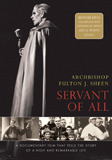 Archbishop Fulton Sheen: Servant of All
Archbishop Fulton Sheen: Servant of All
2 DVDs | 200 minutes
This special double DVD film package includes an acclaimed new film on the great Archbishop Fulton Sheen, Servant of All, along with five of his most popular television programs from his #1 rated TV series, Life is Worth Living. For decades Fulton Sheen was a shining example of what it means to serve God and men. His TV series reached 30 million viewers weekly, and his profound words were captured in over 100 books. Millions were influenced by the way he lived, what he taught and the witness of his personal relationship with God. His cause for sainthood is progressing along in Rome.
This powerful film Servant of All introduces the beloved Archbishop to a new generation that greatly needs his inspiring example of love for God and neighbor. It reveals how the impact of Sheen's prolific life and works continue on in those whose lives he forever changed. Guests interviewed for this film include Fr. Andrew Apostoli, Archbishop Timothy Dolan, Regis Philbin, Fr. Jonathan Morris, biographers of Sheen, his surviving relatives, friends, and many others who were influenced by him.
The five remastered films from his award-winning TV series present Sheen himself with his unique, captivating teaching style on the crucial importance of faith, love and spirituality. The programs are Ages of Man, False Compassion, Love is a Many Splendored Thing, The Divine Sense of Humor and Angels.
Michael O'Brien goes "Between the Covers"...
... and talks to John J. Miller of National Review Online about his latest work, The Father's Tale: A Novel.
The opening pages of the novel can be read on Ignatius Insight:
Secularist Ireland
The government's decision to close its Vatican embassy for lack of "economic return"
Adorning books about Ireland's storied past are such titles as How the Irish Saved Civilization. Today's Ireland, however, is busy losing it. In recent decades secularism has coursed through the country, transforming a pious island that once dispatched missionaries to foreign lands into an agnostic muddle that now needs them.
The news of November brought yet another illustration of secularism's dismal triumph in Ireland: its government decided to shutter the country's Vatican embassy. The Irish government will henceforth maintain remote diplomatic ties from Dublin, a move widely seen as a snub to the Vatican.
As if to underline the small-minded materialism that now holds sway over the Irish elite, Foreign Affairs Minister Eamon Gilmore explained the decision on grounds of crass and dubious economics. "While the embassy to the Holy See is one of Ireland's oldest missions, it yields no economic return," he said.
Ireland has reaped spiritual and cultural riches from its close historic relationship with the Vatican, not to mention material ones through a tourism industry heavily dependent upon the country's charming Catholic past. But Ireland's cocky secularists don't care. Like third-rate Jacobins, they seek to rebuild Irish society from scratch, using the Church's recent disgraces as an anticlerical pretext to turn their backs on history, tradition, and faith.
2011 Best Sellers...
... for Ignatius Press:
Books:
1. YOUCAT
2. Jesus of Nazareth, Vol 2
3. Unplanned
4. Be a Man!
5. He Comes! He Comes!
6. Jesus of Nazareth
7. Catholic Study Bible: New Testament Paperback)
8. Ignatius Bible (RSV) 2nd ed. (Hardcover)
9. Rome Sweet Home
10. Ignatius Bible (RSV) 2nd ed. (Paperback)
Music/CDs:
1. Dream with Me
2. Harmony: The Priests
3. The Priests
4. Chant: Music for the Soul
5. Noel: The Priests
6. The Truth and Life Dramatized Audio Bible
7. Andrea Bocelli: Sacred Arias
8. Voices
9. Jesus of Nazareth: Holy Week
10. The Rosary and the Chaplet of Divine Mercy
Films:
1. No Greater Love
2. The 13th Day
3. Padre Pio Miracle Man
4. Bakhita
5. Edith Stein: The Seventh Chamber
6. St. Giuseppe Moscati
7. The Reluctant Saint
8. Saint Rita
9. Nine Days That Changed the World
10. Of Gods and Men
More lists on this page.
God's plan, the reality of evil, and the Holy Innocents
God has everything in his hand Nothing exists outside the sphere of his influence. Nothing can upset his plans. Augustine formulates this very radically: "Nothing happens that the Almighty does not will should happen, either by permitting it or by himself doing it." 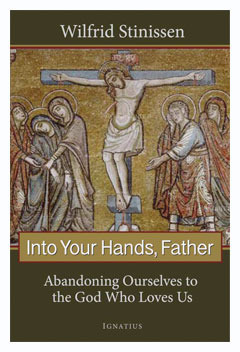 [1] To let something happen is also a decision of God.
[1] To let something happen is also a decision of God.
That God allows so much to happen is a great stumbling block for us. Why is he so passive? Why does he not intervene? How is Auschwitz possible and the torture chamber and the threat of a horrible nuclear war if God is concerned with us? These questions torment us and are not easy to answer. In chapter 2, I will return to this and try to show why God endowed human beings with free will, though he knew that this very freedom would pave the way for terrible catastrophes.
Let us limit ourselves for now to the undeniable fact that the Father did not prevent the painful death of his only-begotten Son. This fact is a kind of archetype, which shows us two things very clearly. The first is that suffering and even total ruin do not signify a lack of love on the part of the Father. The second is that suffering is not in vain; it bears fruit and has redeeming power. Since Jesus has gone through it, suffering has become an instrument of salvation. This applies not only to suffering that is borne generously and heroically. Who knows how we would react in the torture chamber? It is enough that we try as best we can to accept suffering or that we merely allow whatever comes our way to happen. The Church regards the Holy Innocents as martyrs, even though they never consciously or willingly consented to their violent deaths.
God makes use of evil in such a superb way and with such skill that the result is better than if there had never been evil. For those of us who find ourselves in the midst of evil, this is not easy to swallow. We think that the price to be paid for these good results is far too high. But Saint Paul rejoices when he ponders the "mystery", God's magnificent plan, "hidden for ages in God" (Eph 3:9), where evil and sin also have their place. "God has consigned all men to disobedience, that he may have mercy upon all" (Rom 11:32). In this daring passage, which, strictly speaking, seems somewhat questionable, since it seems to place the initiative of sin on God, Saint Paul assures us that even the greatest catastrophe, namely, sin, contributes to the revelation of love. Nothing falls outside of God's plan. That is why the tragedy of the world, despite all its terror, has no definitive character. All the absurdity of which mankind's foolishness and blindness are capable is caught up in God's loving omnipotence. He is able to fit even the absurd into his plan of salvation and thereby give it meaning.
From Fr. Wilfrid Stinissen's Into Your Hands, Father: Abandoning Ourselves to the God Who Loves Us. Read more:
December 27, 2011
Seeing Jesus in the Gospel of John

Seeing Jesus in the Gospel of John | An Excerpt from On The Way to Jesus Christ | Joseph Cardinal Ratzinger
The farewell discourses of Jesus, as the Gospel of John presents them to us, hover in a singular way between time and eternity, between the present 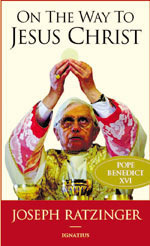 hour of the Passion and the new presence of Jesus that is already dawning, because the Passion itself is at the same time his "glorification" as well. On the one hand, the darkness of the betrayal, of the denial, of the abandonment of Jesus to the ultimate ignominy of the Cross weighs upon these discourses; in them, on the other hand, it seems that all of this has already been overcome and resolved into the glory that is to come.
hour of the Passion and the new presence of Jesus that is already dawning, because the Passion itself is at the same time his "glorification" as well. On the one hand, the darkness of the betrayal, of the denial, of the abandonment of Jesus to the ultimate ignominy of the Cross weighs upon these discourses; in them, on the other hand, it seems that all of this has already been overcome and resolved into the glory that is to come.
Thus Jesus describes his Passion as a going away that leads to a new and fuller coming–as a state of being-on-the-way with which the disciples are already acquainted.[1] Thereupon Thomas, surprised, asks the question, "Lord, we do not know where you are going; how can we know the way?" Jesus answers with a statement that has become one of the central texts of Christology: "I am the way, and the truth, and the life; no one comes to the Father, but by me."
This revelation of the Lord, however, elicits a new question now-or rather, a request, which this time is made by Philip: "Lord, show us the Father, and we shall be satisfied." Again Jesus replies with a revelatory word, which leads from another perspective into the very depths of his self-consciousness, into the very depths of the Church's faith in Christ: "He who has seen me has seen the Father" (Jn 14:2-9). The primordial human longing to see God had taken, in the Old Testament, the form of "seeking the face of God". The disciples of Jesus are men who are seeking God's face. That is why they joined up with Jesus and followed after him. Now Philip lays this longing before the Lord and receives a surprising answer, in which the novelty of the New Testament, the new thing that is coming through Christ, shines as though in crystallized form: Yes, you can see God. Whoever sees Christ sees him.
This answer, which characterizes Christianity as a religion of fulfillment, as a religion of the divine presence, nevertheless immediately evokes a new question. "Already and not yet" has been called the fundamental attitude of Christian living; what this means becomes evident precisely in this passage. For the next question is now (for all of post-apostolic Christianity, at least): How can you see Christ and see him in such a way that you see the Father at the same time?
This abiding question is placed in the Gospel of John, not in the discourses in the Cenacle, but rather in the Palm Sunday account. There it is related that some Greeks, who had made a pilgrimage to Jerusalem to worship, came to Philip–that is, to the disciple who in the Cenacle would voice the request to see the Father. These Greeks present their request to Philip, who was from Bethsaida in Galilee, an extensively Hellenized part of the Holy Land: "Sir, we wish to see Jesus"' (Jn 12:20-21). It is the request of the pagan world, but it is also the request of the Christian faithful of all times, our request: We want to see Jesus. How can that happen?

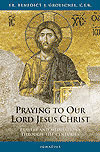


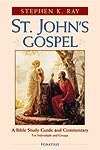

Jesus' response to this request, which was conveyed to the Lord by Philip together with Andrew, is mysterious, like most of the answers that Jesus gives in the fourth Gospel to the great questions of mankind that are posed to him. It is not recorded whether there was an actual encounter between Jesus and those Greeks. Jesus' answer, instead, opens up a horizon that is completely unexpected at this point. For Jesus sees in this request an indication that the moment of his glorification has come. He suggests in greater detail in the following words how this glorification will come about: "Unless a grain of wheat falls into the earth and dies, it remains alone; but if it dies, it bears much fruit" (Jn 12:24).
The glorification occurs in the Passion. This is what will produce "much fruit"–which is, we might add, the Church of the Gentiles, the encounter between Christ and the Greeks, who stand for the peoples of the world in general. Jesus' answer transcends the moment and reaches far into the future: Indeed, the Greeks shall see me, and not only these men who have come now to Philip, but the entire world of the Greeks. They shall see me, yes, but not in my earthly, historical life, "according to the flesh" (cf. 2 Cor 5:16 [Douay Rheims]); they will see me by and through the Passion. By and through it I am coming, and I will no longer come merely in one single geographic locality, but I will come over all geographical boundaries into the farthest reaches of the world, which wants to see the Father.
Jesus announces his coming from the perspective of his Resurrection, his coming in the power of the Holy Spirit, and so he proclaims a new way of seeing that occurs in faith. The Passion is not thereby left behind as something in the past. It is, rather, the place from which and in which alone he can be seen. Jesus expands the parable of the dying grain of wheat that is fruitful only in death into the proper and fundamental pattern for human existence: "He who loves his life loses it, and he who hates his life in this world will keep it for eternal life. If any one serves me, he must follow me; and where I am, there shall my servant be also" (Jn 12:25-26). The seeing occurs in following after, Following Christ as his disciple is a life lived at the place where Jesus stands, and this place is the Passion. In it, and nowhere else, is his glory present.
What does this demonstrate? The concept of seeing has acquired an unexpected dynamic. Seeing happens through a manner of living that we call following after. Seeing occurs by entering into the Passion of Jesus. There we see, and in him we see the Father also. From this perspective the words of the prophet quoted at the end of the Passion narrative of John attain their full greatness: "They shall look on him whom they have pierced" (Jn 19:37; cf. Zech 12:10).[2]
Seeing Jesus, in whom we see the Father at the same time, is a thoroughly existential act. From the verbal perspective we must add that the concept of the "face of Christ" is not found in these Johannine texts. Yet they are implicitly connected with a central theme of the Old Testament, concerning an essential attitude of piety that is described in a series of texts as "seeking the face of God". Despite the difference in terminology; there is a profound continuity between the Johannine "looking on Christ" and the Old Testament "being on the way" toward looking upon the face of God.
In Paul's Second Letter to the Corinthians the verbal connection is also to be found, when he writes about the glory of God that appears in the face of Christ (2 Cor 4:6). We will have to return to this later. Both John and Paul refer us to the Old Testament. The New Testament texts about seeing God in Christ are deeply rooted in the piety of Israel; by and through it they extend through the entire breadth of the history of religion or, perhaps to put it better: They draw the obscure longing of religious history upward to Christ and thereby guide it toward his response.
If we want to understand the New Testament theology of the face of Christ, we must look back into the Old Testament. Only in this way can it be understood in all its depth.
Endnotes:
[1] Romano Guardini has described this interpretation of the farewell discourses very beautifully in: The Lord: Reflections on the Person and the Life of Jesus Christ, trans. Elinor Castendyk Briefs (Chicago: Henry Regnery, 1954), pp. 374-80.
[2] For the interpretation of John 19:37, see also Rudolf Schnackenburg, Das Johannesevangeluin 3 (Herder, 1975), pp. 343-45 [English trans., The Gospel according to St. John (New York: Crossroad, 1982)].
Related IgnatiusInsight.com Articles and Book Excerpts:
• Author Page for Joseph Ratzinger/Pope Benedict XVI
• The Truth of the Resurrection | Excerpts from Introduction to Christianity | Joseph Cardinal Ratzinger
• Seeing Jesus in the Gospel of John | Excerpts from On The Way to Jesus Christ | Joseph Cardinal Ratzinger
• God Made Visible | A Review of On The Way to Jesus Christ | Justin Nickelsen
• A Shepherd Like No Other | Excerpt from Behold, God's Son! | Christoph Cardinal Schönborn
• Encountering Christ in the Gospel | Excerpt from My Jesus | Christoph Cardinal Schönborn
• God Made Visible: On the Foreword to Benedict XVI's Jesus of Nazareth | Fr. James V. Schall, S.J.
• A Jesus Worth Dying For | On the Foreword to Benedict XVI's Jesus of Nazareth | Fr. James V. Schall, S.J.
• The Divinity of Christ | Peter Kreeft
• Jesus Is Catholic | Hans Urs von Balthasar
• The Religion of Jesus | Blessed Columba Marmion | From Christ, The Ideal of the Priest
Joseph Ratzinger, now Pope Benedict XVI, was for over two decades the Prefect for the Congregation of the Doctrine of the Faith under Pope John Paul II. He is a renowned theologian and author of numerous books. A mini-bio and full listing of his books published by Ignatius Press are available on his IgnatiusInsight.com Author Page.
Forget egalitarianism—I want a dish washer with a doctorate!
Occupy Eugene is no more. Alas, the brief and fragile light of higher consciousness and social awareness that disguised itself as a muddy huddle of tents, tarps, and crude cardboard signs was closed down last week after a series of "incidents", most notably a man being beaten and then choked to death. The Eugene Weekly expressed outrage at the merciless, insensitive actions of the police, who apparently were growing tired of living full-time at the site in order to keep assaults, body odor, public defications, and acts of severe violence in check:
The man, Rick Youngblood, was a not a member of the camp, according to Terry, a firefighter who has been volunteering at the camp. Terry and a police officer worked together to give Youngblood lifesaving CPR. [Youngblood died four days later at the hospital.]
The eviction hurts, Terry said, because the incident actually showed "we work well together." He said several of the incidents written up as assaults in the police report that led to the council vote were merely arguments without physical violence.
"We" apparently referring to the fireman and police officer, as Occupy Eugene folks don't seem to know how to perform CPR, or to recognize an assault victim. But, amidst the tragedy, there is also humor, albeit unintentional:
"Shut down before Christmas. How crude," Greg Nagle said. Nagle holds a doctorate in watershed science from Cornell and had been volunteering washing dishes at the camp.
If my Occupy camp ever needs a volunteer dish washer, I'm all for it being someone with a Ph.D. in "watershed science". It makes perfect sense. And lest it be said that the Occupy Eugene movement didn't educate anyone, pay heed to the lesson nestled in this nugget of information:
According to Valkyrie, one of the extraordinary things Occupy has done is bring the street families together and let street kids learn from older activists, and the activists in turn learn from the street families.
"A Ph.D. stands next to a homeless kid and they both have an equal say and an equal vote," she said.
Who really is more intelligent: the man who spends many years and tens of thousands of dollars earning a doctorate in watershed science, or the street kid who figures out how to get said Ph.D. to wash dishes for her? (Put that in your dish washer and rinse it!)
Finally, lest my glib remarks appear flippant (or my flippant observations seem glib), the executive director of FOOD for Lane County points out the obvious:
It was pointed out that there were homeless people in Eugene. And some people were hungry. And for some reason some among the movement thought that those conditions had gone unnoticed and ignored in our community until the conditions were pointed out by demonstrations in the downtown park blocks, Alton Baker Park, Franklin Boulevard, on the University of Oregon campus, and finally at the Washington-Jefferson Park portion of the Willamette Greenway.
What a shame they might have thought that. And what an affront that suggestion seems to the thousands and thousands and thousands of people who for decades have been giving their time, their money and their hearts to the needy people in our community. ...
It's amazing how generous the people of Lane County have always been. And it's a little frustrating for somebody to come along and suggest that you haven't done anything before.
This gets to one of my biggest issues with the Occupy movement: its ignorant arrogance, fueled by an angry and sometimes destructive self-righteousness that was both obviously naive (about history, reality, and everything else) and ideologically driven. It was, in short, infantile, and in the worst possible meaning of the word.
• Meanwhile, in an alternative universe... (Dec. 5, 2011)
• What would Jesus Occupy? (Nov. 29, 2011)
• Occupy Olsons: A Report From the Front Lines (Nov. 3, 2011)
Carl E. Olson's Blog
- Carl E. Olson's profile
- 20 followers






